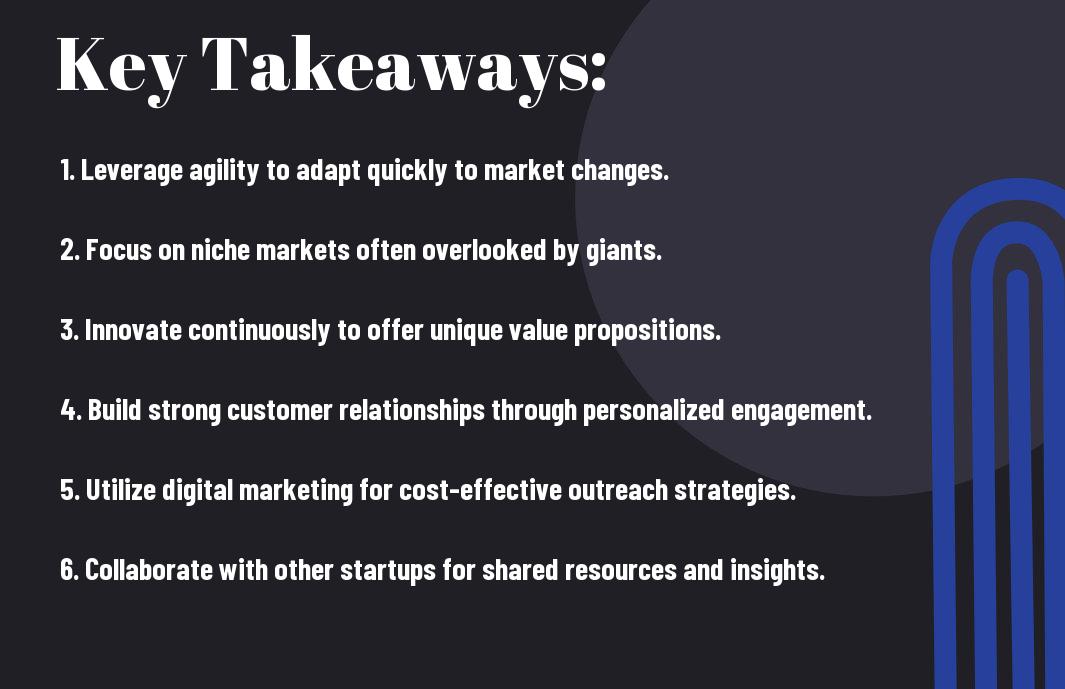
Overcoming the challenges posed by industry giants can seem daunting for startups, but with the right strategies, you can carve out your niche and thrive. By leveraging innovation, building strong customer relationships, and maintaining agility, you can position your startup to compete effectively. This post will guide you through key tactics that will empower you to take on larger competitors and make your mark in the marketplace.

Understanding the Landscape
For any startup, understanding the landscape of your industry is paramount to carve out a competitive edge. You must analyze current trends, customer needs, and regulatory requirements that impact your niche. Gaining insight into these elements will help you identify opportunities and potential hurdles as you navigate your path toward growth and sustainability.
Market Dynamics
Across various sectors, market dynamics play a vital role in shaping how startups can position themselves against larger competitors. You should closely monitor factors such as technological advancements, consumer behavior changes, and economic shifts. Recognizing these dynamics will guide your strategy, allowing you to adapt and innovate in response to the ever-evolving market landscape.
Identifying Key Competitors
Above all, identifying key competitors is necessary for your startup’s strategic planning. Understanding who your competitors are and what they offer enables you to accurately assess your unique selling propositions. This intel is fundamental in determining how you can differentiate your product or service in a crowded marketplace.
Even more importantly, you should consider not just direct competitors, but also emerging players that may disrupt the market. Analyze their strengths, weaknesses, and market position to determine where you can find your niche. This comprehensive understanding will not only aid in defining your competitive strategy but also in anticipating shifts that could impact your business model. By keeping your finger on the pulse of the competition, you position your startup for long-term success against industry giants.
Leveraging Innovation
It is vital for startups to leverage innovation as a cornerstone of their strategy to successfully compete against industry giants. By fostering a culture that embraces creativity and experimentation, you can develop unique solutions that set your offerings apart and resonate with customers. Harnessing emerging technologies and trends allows you to pivot quickly, ensuring your business remains relevant and ahead of the competition.
Emphasizing Unique Value Propositions
Among the key elements that distinguish your startup from larger competitors is your unique value proposition (UVP). Clearly articulating what makes your product or service stand out allows you to attract specific customer segments. This focus on differentiation can drive loyalty and encourage word-of-mouth referrals, accelerating your growth in a crowded marketplace.
Adopting Agile Methodologies
Across the startup landscape, adopting agile methodologies enables you to respond swiftly to market changes and customer feedback. This adaptability fosters a more iterative development process, resulting in products that are better aligned with user needs and expectations.
But embracing agile methodologies isn’t just about the speed of delivery; it’s also about cultivating a mindset of continuous improvement within your team. By encouraging collaboration and iterative testing, you create an environment where ideas can evolve quickly based on real-world feedback. This flexibility makes it easier for you to pivot when necessary, allowing your startup to stay ahead of trends and maintain a competitive edge over industry giants.
Building a Strong Brand
Despite the overwhelming presence of industry giants, startups can carve out a unique space by building a strong brand. By clearly defining your values, mission, and vision, you’ll resonate more deeply with your target audience. Focus on creating a distinct voice and image that reflects your company’s ethos, allowing you to stand out and attract loyal customers.
Establishing Brand Identity
About establishing a brand identity, it is vital to communicate what sets your startup apart from the competition. This involves creating a cohesive visual language, utilizing logos, color schemes, and typography that align with your brand values. By consistently presenting your identity across all platforms, you strengthen recognition and foster emotional connections with your audience.
Creating Customer Loyalty
After building a brand identity, creating customer loyalty becomes your next priority. Strong customer relationships are built on trust, consistency, and engagement. By staying attentive to customer needs and delivering quality experiences, you create advocates for your startup who will return and refer others.
Hence, fostering customer loyalty requires ongoing efforts to engage your audience. Show appreciation through personalized communications, loyalty programs, or exclusive promotions. Actively solicit feedback and adapt your offerings based on customer input. By prioritizing your customers and valuing their experiences, you establish a loyal community that supports your startup and helps drive its growth.
Strategic Partnerships
All startups can significantly boost their market presence and resources through strategic partnerships. By collaborating with other businesses and organizations, you can leverage complementary strengths, share resources, and access new customer bases, all of which help level the playing field against larger competitors. Establishing thoughtful alliances can enhance your brand visibility and open doors to innovative opportunities that drive growth.
Collaborating with Other Startups
Around you, many startups are eager to collaborate and explore synergies that can lead to mutual success. By partnering with fellow startups, you can combine resources, share knowledge, and co-develop products or services that cater to a larger audience. This collaborative spirit fosters innovation and strengthens your competitive edge, helping both startups thrive in a dynamic market environment.
Engaging with Industry Leaders
About engaging with industry leaders, it’s important to position yourself in a way that attracts their attention and interest. Building relationships with established companies and influencers can provide mentorship, access to valuable networks, and even potential investment opportunities. By showing your dedication and the unique value your startup brings, you can create partnerships that propel your business forward and improve your visibility in the industry.
Other key aspects of engaging with industry leaders involve actively attending relevant conferences, participating in networking events, and utilizing social media to connect with influential individuals. By showcasing your expertise and passion for your niche, you open up pathways for meaningful interactions. Additionally, seeking collaborations with established players may provide insights into market trends and best practices, helping you position your startup for increased success.
Utilizing Technology
Your startup can gain a competitive edge by leveraging technology effectively. By adopting innovative tools and platforms, you can streamline operations, enhance customer engagement, and optimize resource management. This not only allows you to operate at a lower cost but also helps you respond to market changes swiftly, positioning your business favorably against industry giants.
Embracing Digital Tools
For startups, embracing digital tools is necessary in the modern marketplace. By integrating software solutions and platforms tailored to your specific needs, you can automate repetitive tasks, improve communication, and enhance overall productivity, freeing your team to focus on growth initiatives.
Data-Driven Decision Making
Along with embracing technology, utilizing data-driven decision making can significantly impact your startup’s success. By gathering and analyzing relevant data, you can make informed choices that align with market trends, customer preferences, and operational efficiencies.
Decision making backed by data allows you to identify opportunities and risks, ensuring more precise strategies. By tracking metrics such as customer behavior, sales performance, and market trends, you can refine your approach continuously. This level of insight provides a significant advantage over larger competitors who might rely on more generalized strategies, giving you the capacity to tailor your offerings and pivot quickly in response to changing circumstances and needs.
Financing and Resources
Keep in mind that securing adequate financing and resources is vital for your startup’s growth. Whether you choose to bootstrap or seek external funding, finding the right balance can help you maintain control while ensuring you have the means to scale effectively. Understanding your options can empower you to make informed decisions about your business’s financial future.
Bootstrapping vs. External Funding
About navigating the landscape of funding is necessary for your startup’s success. Bootstrapping allows you to retain full ownership and make decisions without external interference, but it can limit your growth potential. On the other hand, external funding can provide you with the capital needed to scale rapidly, but it often comes with strings attached, including equity dilution and stakeholder involvement.
Managing Finances Wisely
Before stepping into growth initiatives, you must have a solid grasp of your financial situation. This includes tracking cash flow, maintaining a budget, and evaluating expenditures regularly. Keeping your finances organized helps avoid pitfalls that can derail your progress and ensures that you can allocate resources effectively to support your startup’s objectives.
Another key aspect of managing finances wisely is prioritizing investments that yield the highest returns. Establishing a clear financial plan that outlines both short-term and long-term goals will help you allocate funds strategically. Regularly reviewing your financial health and adjusting your budget allows you to allocate resources where they’ll make the most impact, fostering sustainable growth in the face of competition from larger players.
Summing up
On the whole, to effectively compete with industry giants, you should leverage your agility, focus on niche markets, and foster innovation. Utilize digital marketing strategies to build a strong online presence and engage directly with your audience. Cultivating strong relationships with your customers can lead to deep loyalty that larger companies may struggle to replicate. By continuously adapting and staying on top of market trends, you can position your startup as a formidable contender in a competitive landscape.
Leave a Reply